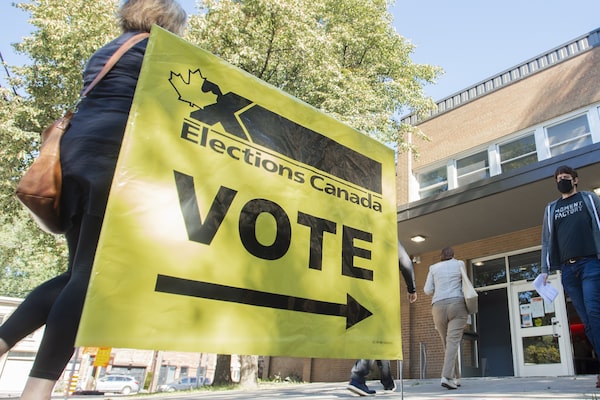
As of Dec. 14, Elections Canada had received more than 9,400 complaints relating to last year’s election.Graham Hughes/The Canadian Press
Police responded to 78 harassment calls at polling stations, including physical attacks on poll workers, during last year’s federal election, according to a new report by Elections Canada.
The report, tabled Monday in the House of Commons by Chief Electoral Officer Stéphane Perrault, said the COVID-19 pandemic and “trends in the political environment,” including growing polarization and extremism online, likely increased the frequency and escalation of confrontations at polling stations. Elections Canada officials said there was a total of 102 reports of security concerns at polling stations, most of the incidents involving people protesting mask and vaccination mandates. (The 2019 election report did not specify the number of physical security concerns.)
Speaking to reporters, Michel Roussel, deputy chief electoral officer for electoral events and innovation, said Mr. Perrault was concerned by the attacks on poll workers, despite remaining quiet at the time of the reports.
“When election officers were harassed, some were attacked, some were punched,” Mr. Roussel said. “He did not speak up too much at that time, for fear of discouraging people from showing up to vote on election day. We kept a low profile but it needs to be said – this is something extremely irritating, disappointing.”
Freeland lists housing affordability, green transition and jobs as 2022 budget priorities
O’Toole faces caucus revolt as 35 MPs sign letter calling for leadership review vote
Elections Canada said it closely monitored the political environment and communicated with security and intelligence agencies about any concerns at polling stations. Returning officers in 111 of Canada’s 338 electoral districts requested and received a budget increase for private security at certain locations.
“This is something we developed early in the election with the security forces and private security companies hired across the country in specific locations where we had intelligence that there might be issues. I would expect that this will be in place … again at the next election,” Mr. Roussel said.
While health and safety measures such as masking requirements did result in some tension, Elections Canada deemed the protocols successful, as there were no COVID-19 outbreaks traced back to polling stations.
A spokesperson for Intergovernmental Affairs and Infrastructure Minister Dominic LeBlanc, whose responsibilities include protecting the federal electoral process, said the Liberal government will review the Elections Canada report and support the agency to ensure elections are safe and accessible to all Canadians.
“Poll workers undertake an essential function in our electoral process, and they deserve to be treated with respect and dignity while doing their job,” press secretary Jean-Sébastien Comeau said in an e-mail.
The election cost an estimated $630-million, according to the report, compared with an estimated $504-million in 2019. As with the federal election in 2019, Elections Canada struggled to recruit staff to work at the polling stations. It increased its recruitment budget for poll workers, as more people were needed to ensure compliance with health and safety measures, and upped their pay rates.
As of Dec. 14, Elections Canada had received more than 9,400 complaints relating to last year’s election. The majority were related to accessibility, voter experience, interactions with poll workers, voting by special ballot and lines at polling stations. Long waits plagued some locations on election day, testing people’s patience as COVID-19 protocols and fewer polling stations slowed the process. Compared with the 2019 federal election, there were 7 per cent fewer polling stations and 3 per cent fewer advance polling stations.
Elections Canada officials apologized after three First Nations communities in Kenora, Ont., did not have access to polling stations on election day. First Nations leaders in Cat Lake, Poplar Hill and Pikangikum expressed concern that many residents would be participating in traditional hunting and cultural activities on election day, so in-person voting services were moved to Sept. 13 from Sept. 20. However, since the change was made so late in the campaign period, new voter information cards were not sent to residents and some people were unable to cast their ballots.
“The communication was not executed very well on the ground on our part,” Mr. Roussel said.
For subscribers: Get exclusive political news and analysis by signing up for the Politics Briefing.